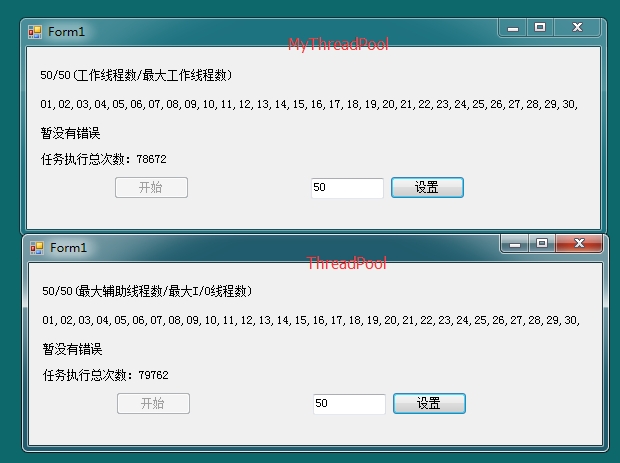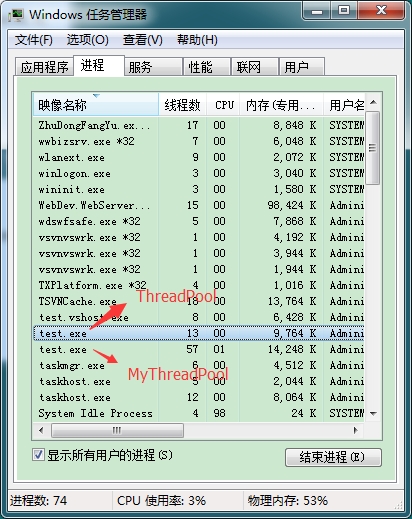自已寫的線程池,自已寫線程池
C#有ThreadPool和Task,為什麼還要自己寫線程池?我以前也沒想過自己寫線程池,都是用ThreadPool或Task,前段時間寫爬蟲,我想控制10個線程爬網頁、10個線程下載網頁上的圖片,不然的話因為網頁很多,圖片相對較少,可能大部分線程都在爬網頁,少量線程在下載圖片,這樣下載圖片的速度慢了,所以我想到了自己寫線程池MyThreadPool,再配合ThreadPool使用,精確控制爬網頁和下載圖片的線程數。不過這個線程池寫的比較簡單,缺點是線程池會瞬間創建最大數量的工作線程。
線程池類代碼:

![]()
using System;
using System.Collections.Concurrent;
using System.Collections.Generic;
using System.Linq;
using System.Text;
using System.Threading;
namespace Common.Utils
{
/// <summary>
/// 線程池
/// </summary>
public static class MyThreadPool
{
/// <summary>
/// 最大工作線程數
/// </summary>
private static int m_WorkerThreads = 10;
/// <summary>
/// 線程隊列
/// </summary>
private static ConcurrentQueue<MyThread> m_ThreadQueue = new ConcurrentQueue<MyThread>();
/// <summary>
/// 任務隊列
/// </summary>
private static ConcurrentQueue<Tuple<MyAction, object>> m_Action = new ConcurrentQueue<Tuple<MyAction, object>>();
/// <summary>
/// 創建並啟動線程
/// </summary>
/// <param name="action"></param>
/// <param name="obj"></param>
public static void Start(MyAction action, object obj = null)
{
m_Action.Enqueue(new Tuple<MyAction, object>(action, obj));
MyThread thread;
if (m_ThreadQueue.Count < m_WorkerThreads)
{
thread = new MyThread();
m_ThreadQueue.Enqueue(thread);
thread.isWorker = true; //設置為工作線程
thread.thread = new Thread(new ThreadStart(() =>
{
Tuple<MyAction, object> tuple;
while (thread.isWorker) //如果是工作線程,則一直循環
{
if (m_Action.TryDequeue(out tuple)) //如果任務隊列中有任務,則取出任務執行
{
tuple.Item1(tuple.Item2); //執行任務
}
Thread.Sleep(1);
}
}));
thread.thread.IsBackground = true;
thread.thread.Start();
}
}
/// <summary>
/// 設置最大工作線程數
/// </summary>
/// <param name="workerThreads">最大工作線程數</param>
public static void SetMaxThreads(int workerThreads)
{
m_WorkerThreads = workerThreads;
MyThread thread = null;
while (m_ThreadQueue.Count > m_WorkerThreads)
{
m_ThreadQueue.TryDequeue(out thread);
thread.isWorker = false;
Thread.Sleep(1);
}
}
/// <summary>
/// 獲取最大工作線程數
/// </summary>
public static int GetMaxThreads()
{
return m_WorkerThreads;
}
/// <summary>
/// 獲取當前工作線程數
/// </summary>
public static int GetWorkerThreads()
{
return m_ThreadQueue.Count;
}
}
/// <summary>
/// 任務
/// </summary>
/// <param name="obj">任務參數</param>
public delegate void MyAction(object obj);
/// <summary>
/// 線程
/// </summary>
public class MyThread
{
/// <summary>
/// 線程
/// </summary>
public Thread thread { get; set; }
/// <summary>
/// 是否工作線程
/// </summary>
public bool isWorker { get; set; }
}
}
View Code
測試代碼:

![]()
using System;
using System.Collections.Generic;
using System.ComponentModel;
using System.Data;
using System.Drawing;
using System.IO;
using System.Linq;
using System.Text;
using System.Threading;
using System.Threading.Tasks;
using System.Windows.Forms;
using Common.Utils;
using System.Collections.Concurrent;
namespace test
{
public partial class Form1 : Form
{
private static int errorCount = 0;
private static int errorCount2 = 0;
private static object _lock = new object();
private static int dataCount = 30;
/// <summary>
/// 任務執行總次數
/// </summary>
private static int runCount = 0;
public Form1()
{
InitializeComponent();
}
private void Form1_Load(object sender, EventArgs e)
{
ThreadPool.SetMaxThreads(20, 20);
StringBuilder sb = new StringBuilder();
for (int k = 1; k <= dataCount; k++)
{
sb.AppendFormat("{0},", k.ToString("00"));
}
lblMsg2.Text = sb.ToString();
timer1.Tick += new EventHandler((obj, ea) =>
{
int maxThreads = MyThreadPool.GetMaxThreads();
int workerThreads = MyThreadPool.GetWorkerThreads();
lblMsg.Text = string.Format("{0}/{1}(工作線程數/最大工作線程數)", workerThreads, maxThreads);
//ThreadPool.GetMaxThreads(out workerThreads, out maxThreads);
//lblMsg.Text = string.Format("{0}/{1}(最大輔助線程數/最大I/O線程數)", workerThreads, maxThreads);
if (workerThreads > maxThreads)
{
errorCount++;
lblError.Text = "錯誤(工作線程數超過最大工作線程數)次數:" + errorCount.ToString() + ",錯誤(線程內代碼執行結果錯誤)次數:" + errorCount2.ToString();
}
if (lblMsg2.Text != sb.ToString())
{
errorCount2++;
lblError.Text = "錯誤(工作線程數超過最大工作線程數)次數:" + errorCount.ToString() + ",錯誤(線程內代碼執行結果錯誤)次數:" + errorCount2.ToString();
LogUtil.LogError(lblMsg2.Text);
}
lblRunCount.Text = "任務執行總次數:" + runCount.ToString();
});
timer1.Interval = 100;
timer1.Start();
lblError.Text = "暫沒有錯誤";
}
//開始
private void button1_Click(object sender, EventArgs e)
{
MyThreadPool.SetMaxThreads(20);
ThreadPool.SetMaxThreads(20, 20);
button1.Enabled = false;
Thread thread = new Thread(new ThreadStart(() =>
{
while (true)
{
List<int> list = new List<int>();
for (int i = 1; i <= dataCount; i++)
{
// ThreadPool.QueueUserWorkItem((obj) =>
// Task.Factory.StartNew((obj) =>
MyThreadPool.Start((obj) =>
{
int n = (int)obj;
lock (_lock)
{
list.Add(n);
}
if (list.Count == dataCount)
{
list.Sort();
StringBuilder sb = new StringBuilder();
for (int k = 0; k < list.Count; k++)
{
sb.AppendFormat("{0},", list[k].ToString("00"));
}
this.Invoke(new MyInvoke(() => { lblMsg2.Text = sb.ToString(); }));
runCount++;
}
}, i);
}
Thread.Sleep(1);
}
}));
thread.IsBackground = true;
thread.Start();
}
//設置最大工作線程數
private void button2_Click(object sender, EventArgs e)
{
int d;
if (int.TryParse(txtMaxThreads.Text, out d))
{
if (d > 0)
{
MyThreadPool.SetMaxThreads(d);
ThreadPool.SetMaxThreads(d, d);
}
else
{
txtMaxThreads.Text = "1";
}
}
else
{
txtMaxThreads.Text = "20";
}
}
}
public delegate void MyInvoke();
}
View Code
測試截圖:





